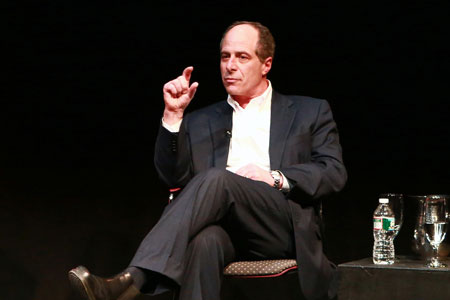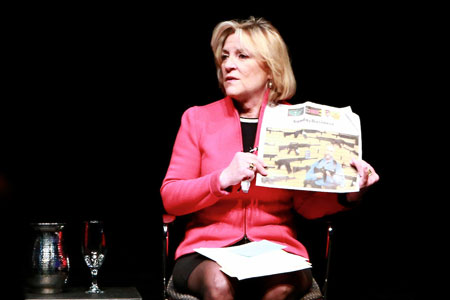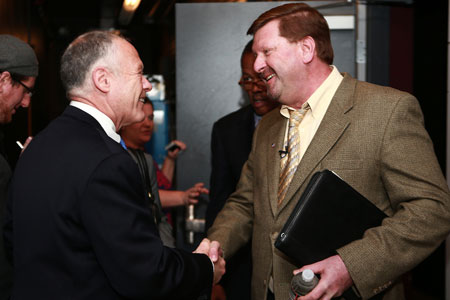Passionate views shared in gun talk
Despite a civil tone, pro- and anti-gun panelists found little common ground when discussing how the nation should address its gun violence epidemic during “Whose Right Is It, Anyway?” at Emerson’s Jackie Liebergott Black Box Theatre on February 4.
The discussion was the first in a series titled Made in America: Our Gun Violence Culture, and is part of President Lee Pelton’s national initiative to create a dialogue on the issue of firearms. The event drew a full house.
“Of course, the reason we’re having this discussion is because of what happened on December 14, 2012, when 20 children and six adults were mowed down at an elementary school in Newtown, Connecticut,” said panel moderator Emily Rooney, host of Greater Boston on WGBH-TV. “That put us over the top. But two days earlier, there had been a mass shooting at a mall in Oregon. We can’t even keep track of it anymore.”
There were 32,163 total deaths from guns in the U.S. in 2011, marking a steady increase since 2000 when 28,663 total deaths were reported, according to Gunpolicy.org. By comparison, in Canada, there were 759 gun homicides and suicides in 2009; 155 total gun deaths in England in 2010; and 11 gun homicides in Japan in 2008, according to Gunpolicy.org.

“God help us if we can’t fix this,” said John Rosenthal, founder of Stop Handgun Violence and a gun owner. “Thirty-three states don’t even require background checks—not even proof of I.D.—if you’re buying from private gun dealers. Only federally licensed gun dealers have to run background checks, and they only sell roughly 50 percent of the guns sold every year.”
Rosenthal said he supports federally mandated background checks and closing gun show and private dealer loopholes.
When asked by Rooney if there should be more gun regulation in the U.S., panelist Steve Moysey, counter-terrorism specialist and director of the Gun Owners’ Action League (the Massachusetts chapter of the National Rifle Association), said there has been more focus on the gun rather than the shooter after recent mass shootings.
“We don’t look at, necessarily, the medical state of the person who was doing the shooting,” Moysey said. “Plus we have the other issue of the use of anti-depressant drugs among children and adolescents.”

Richard Feldman, a firearms rights activist and former gun lobbyist, took issue with some of the language used in the gun dialogue—even more so after Rooney referenced a recent New York Times article and asked if anyone needs to own an AR-15 rifle, which usually has a 30-round magazine and is selling in high numbers in light of pending firearms restrictions.
“No one needs to have several homes in the country,” Feldman said. “No one needs to have automobiles capable of doing 160 miles per hour when … 75 miles per hour is the speed limit. The distinction is we want it. And frankly, any gun that goes on the proposed ban list goes on Richard Feldman’s buy list.”
Rosenthal said civilians should not possess military-style weapons.
“The weapon used at the Fort Hood military base [in a massacre in which 13 were killed and 29 wounded in 2009] was actually marketed as being able to penetrate 48 layers of soft body armor,” Rosenthal said. “That shooter used it on a military base because he figured that’s where people would be wearing soft body armor.”
Panelist Jack McDevitt, associate dean at Northeastern University’s College of Criminal Justice, said, “there’s no simple solution” to the issue.
“It’s complex, but that just means it’s a little more challenging,” McDevitt said. “We can fashion something that would reduce gun violence and protect the rights of gun owners and protect the confidentiality rights of individuals. I think there are models out there.”

Categories